When it comes to getting started with electric guitar picks (also called “plectrums”), it can be a bit overwhelming with all the different choices. Different thicknesses, shapes, and sizes can all make a difference to how a pick feels to use, and every guitarist will develop a preference over time.
I’ve been playing guitar for over 15 years, and remember the struggle of trying to find a pick that works for me. Even then, I had to go through the exact same process when it came to acoustic and bass guitar!
So, I’ve written this guide on the best guitar picks for a beginner based on my knowledge and experience, that will save you time and money, so you can just focus on playing!
You can use these links to jump to a section on this page:
Affiliate disclaimer: This page contains affiliate links for recommended products that I’ve tried and tested. As an Amazon Associate I earn from qualifying purchases at no additional cost to you. Learn more here.
Best electric guitar picks for a beginner
Guitar picks are an essential tool if you’re playing the electric guitar (unless you’re Mark Knopfler!). To help you start rocking out, you’re going to need to find a pick that works for you. Here are my top recommendations for the best electric guitar picks for beginners.
1. Dunlop Electric Guitar Pick Variety Pack
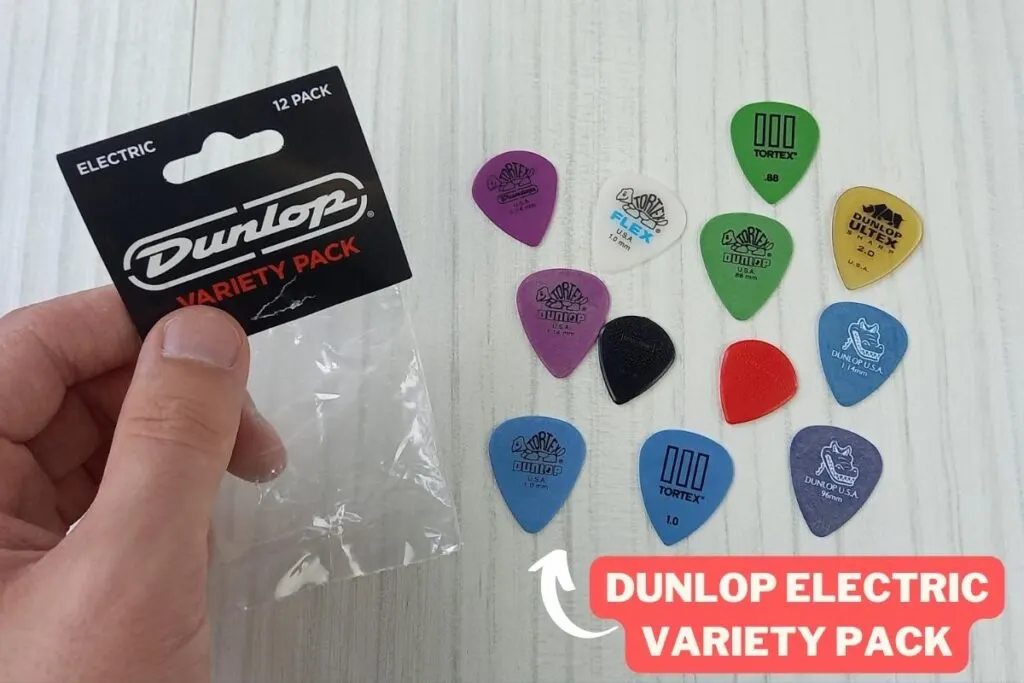
Positives
- Cost effective way to find the right guitar pick for you
- 12 picks with different sizes and materials
- Long lasting
- Used by beginners and professionals
Negatives
- You might be left with a few picks you don’t use (but it’s always good to have spares!)
Why I recommend these picks for beginners:
Dunlop’s Tortex guitar picks are an industry standard guitar pick that are used by both beginners and professional guitarists alike. They’re tough and durable which makes them a great long lasting choice. When I started playing guitar, the Tortex guitar picks were the first ones that I used!
This variety pack comes with guitar picks of different materials and thicknesses (from 0.50mm to 1.14mm) so you can find the pick thickness that’s best for you. It’s a really cost effective way to find what’s comfortable for you to play before you buy a bunch of them.
Not only this, but the different thicknesses can be used for different types of playing. You might find that you want a thinner pick for strumming and a thicker pick for soloing – the choice is up to you.
Most of these are “standard” sized picks, meaning that they have a wide area to grip. This makes them a great choice for beginners to develop a proper picking technique. But, there are also two smaller picks included – the Jazz III’s (but more on those in a minute!). These can be fun to try out if you’ve not tried them before.
The only downside to this variety pack is that you might be left with some picks you don’t need. But, it’s always good to have some spare picks around. As a beginner, I was always losing my guitar picks, so it’ll be handy to have a couple for emergencies!
2. Dunlop Jazz III
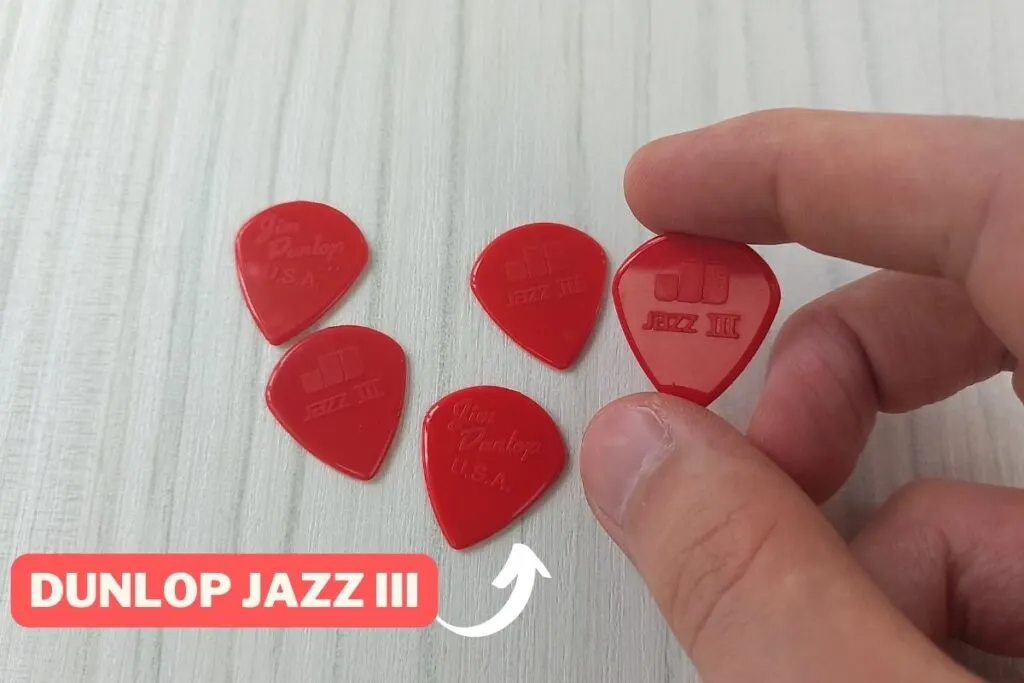
Positives
- Sharp tip improves accuracy
- Small profile makes it easier to use
- Gripping surface prevents slipping
Negatives
- Small shape might be a bit difficult for a beginner
- Thickness may be off-putting for some
Why I recommend this pick for beginners:
Don’t be fooled by the name, the Dunlop Jazz III picks aren’t only for jazz. When I first discovered this pick, though Joe Bonamassa, it changed the way that I play guitar. It’s since become my go-to guitar pick. Personally, I wish that I’d discovered them earlier, which is why I’m recommending them here.
The Dunlop Jazz III’s are a smaller style pick with a sharp tip that’s great for string picking accuracy. It also means that you’ll be using less surface area of the pick, which is generally easier for playing as there’s less resistance from the strings.
There’s also a Jazz III pick available with a “max grip” textured surface, for superior grip.
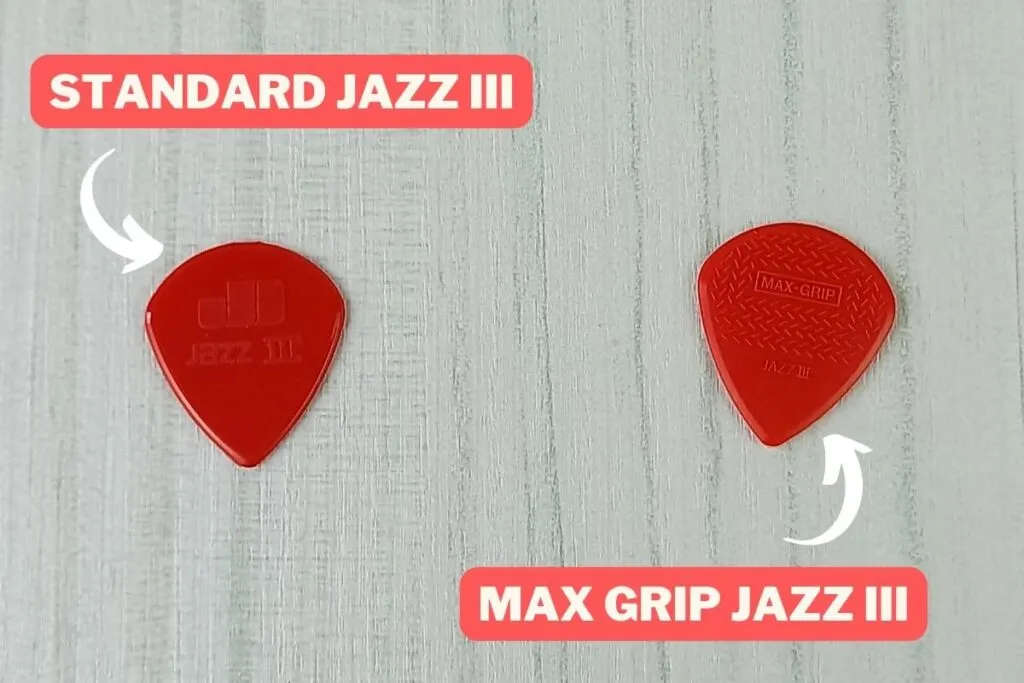
That being said, these picks aren’t for everyone. They’re on the thicker side than most guitar picks (1.38mm) which some players might find harder to use. Likewise, the smaller shape may take some getting used to, when you should be focused on learning chords and scales.
Still, the Dunlop Jazz III really took my playing to the next level. I’d say it’s great pick to try if you love hard rock or metal and want to learn soloing, shredding, or any of that good stuff.
3. Novelty Guitar Picks
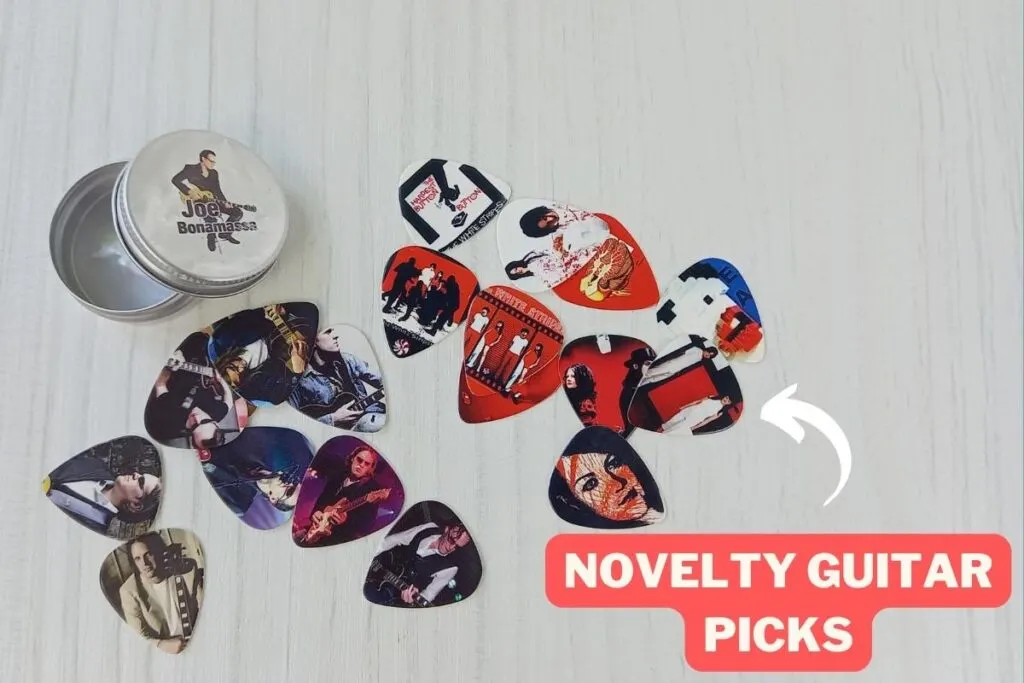
Positives
- Great gift idea for a beginner guitarist
- Some come with tins (a good place to store picks!)
Negatives
- Quality can be hit-or-miss for unbranded products
- Generic sizes may not be to everyone’s taste
Why I recommend these picks for beginners:
Guitar playing is a great hobby that you can use to express your individuality, and you can do this further with novelty guitar picks.
These types of guitar picks range in quality across the board, so it’s probably best to get them from a reputable brand. In fact, Dunlop makes artist-specific guitar picks that come in a custom tin, which is a great place to store them. Having a guitar pick tin (and guitar picks) with an artists picture on can be a great way to inspire you to keep practising!
When I first started playing, I used to get gifted guitar picks with my guitar-heroes on them. While they weren’t always my go-to pick, they were a great backup! I’d recommend these for beginners who want to express themselves and have a bit of fun during those long practice sessions.
Best acoustic guitar picks for a beginner
Acoustic guitar has come a long way since its finger-picking origins. Contemporary artists like Rodrigo Sánchez (Rodrigo y Gabriela) and Kyle Gass (Tenacious D) are known for their aggressive playing style that demands the use of a pick! Here are my top choices for acoustic guitar picks for a beginner.
1. Dunlop Acoustic Guitar Pick Variety Pack
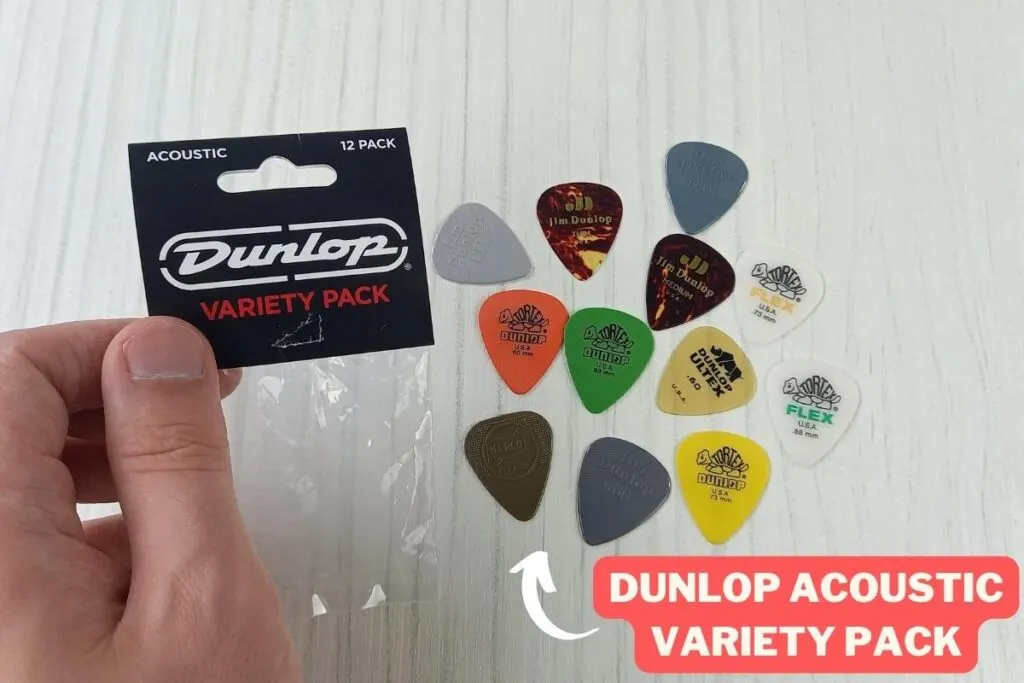
Positives
- Cost effective way to find the right guitar pick for you
- Long lasting
- Used by beginners and professionals
Negatives
- You might be left with a few picks you don’t use (but it’s always good to have spares!)
Why I recommend these picks for beginners:
When I started playing acoustic guitar, I quickly discovered that my beloved Dunlop Jazz III picks didn’t work for me. So, I quickly picked up a Dunlop variety pack to try out a bunch of different types.
This variety pack is a great way to find the best pick type for you. By trying out the different thicknesses, you’ll quickly learn which one best works with your style of playing.
And it’s not only different thicknesses: this pack has picks of different shapes and materials as well. The material of a guitar pick can affect its tone, so having different options will let you find the material that sounds best to you. Likewise, having different pick shapes will help you find a shape that feels comfortable in your hand.
Like any variety pack, you might end up with some spare picks that you don’t use as much. But, you’ll probably find that you’ll need them as back-ups if you ever lose your preferred picks (which happens, trust me!).
2. Dunlop Tortex 0.88mm
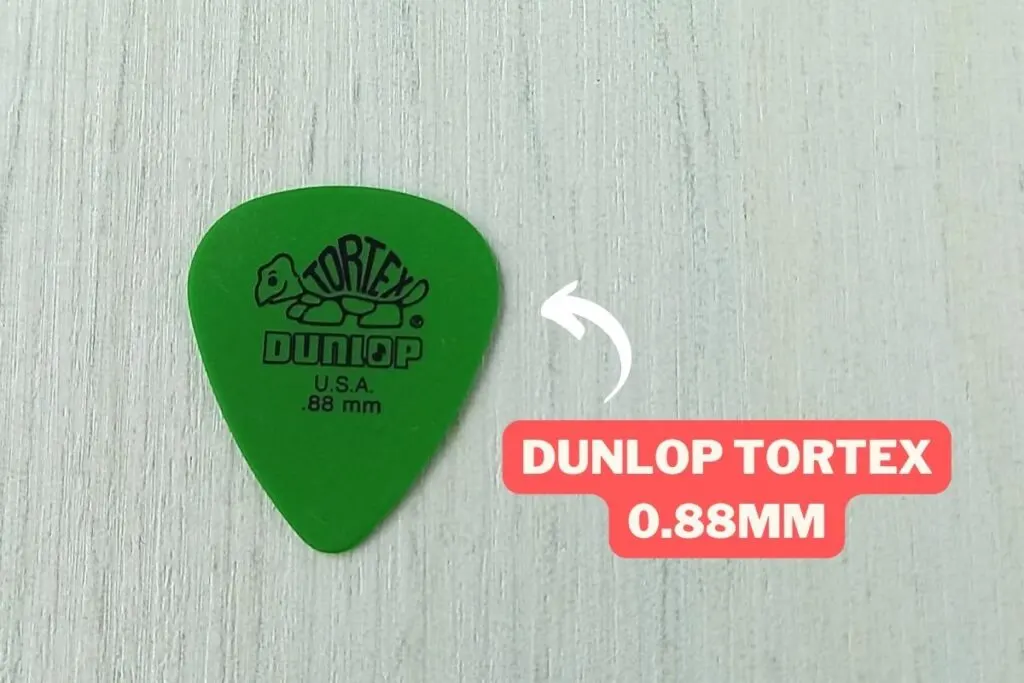
Positives
- Great for both strumming and picking
- Matte texture makes it very easy to grip
Negatives
- This pick works best for me, but may not for you!
Why I recommend this pick for beginners:
The Dunlop 0.88mm is my go-to acoustic guitar pick that I’ve found works great for both strumming and picking styles. For strumming, it has a little bit of flexibility, which means that it’s not too hard on the strings, giving them a strong tone that isn’t too bright. But, the pick isn’t flimsy either. It’s strong enough to be good for picking and articulating individual strings.
This pick also has a matte texture, whereas most guitar picks have a glossy finish. The matte finish feels slightly chalky, and means that it’s a lot easier to grip. This is great for new players who might have a harder time holding onto their picks.
I docked this pick half of a star, as I think the variety pack is a better way for finding your preferred guitar pick. I’ve seen the 0.73mm pick recommended for beginners, but I found it to be a bit too flexible for my liking. They both come in the variety pack, so it might be worth checking out for yourself, but the 0.88mm gets my vote!
Best bass guitar picks for a beginner
Back in the day, using a pick to play a bass guitar would be frowned upon by bass “purists”. But, plenty of professional bass players are happy to use a pick. As a player, I use bass picks because I find them easier to use, and they have a sharper sounding tone. Here’s my recommendations for the best bass picks to get you started.
1. Dunlop Bass Guitar Pick Variety Pack
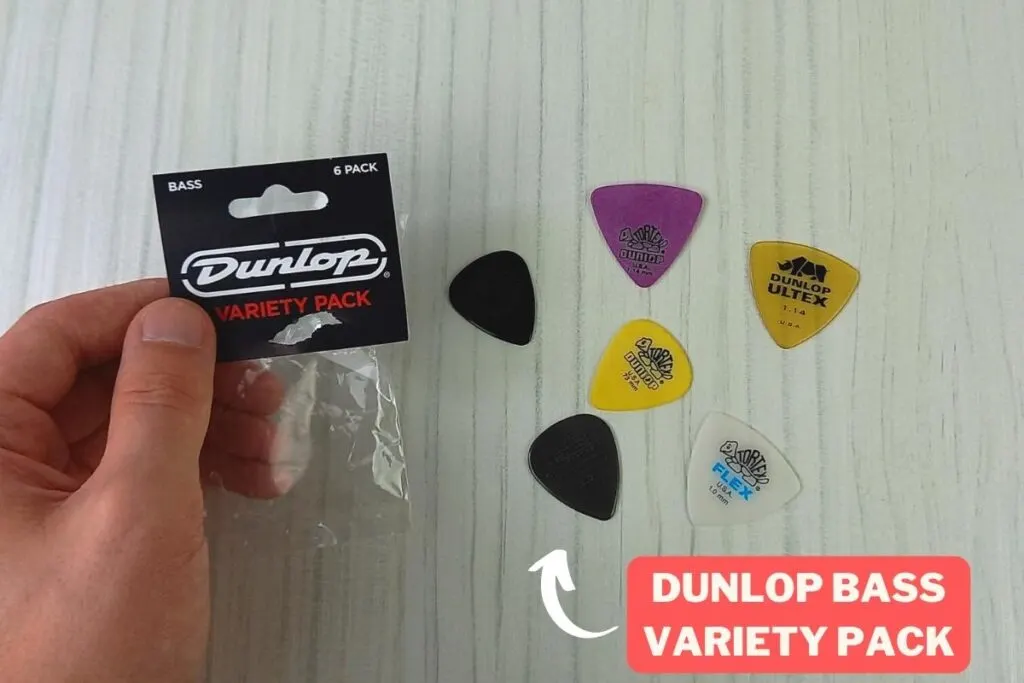
Positives
- Cost effective way to find the right pick for you
- Includes different sizes, as well as thicknesses
- Long lasting and durable picks
Negatives
- Larger picks might take time to get used to
Why I recommend these picks for beginners:
If you’re new to bass, or new to bass picks, then you might not know what size and shape works best for you. That’s why I’ve chosen the Dunlop bass pick variety pack as the best guitar pick for a beginner bass player.
This variety pack comes with six bass guitar picks of different shapes and sizes. So, you can try out a wide range of picks without having to buy a whole pack of each. It’s a really cost effective way to sample the different types of pick available to find the one that works for you.
The sizes range from 0.73mm to 1.14mm. I found that thicker picks give me a larger, fuller sound, but thinner picks were easier to play with longer. Likewise, the different shapes have different tonal characteristics. i find that pointier picks make a brighter sound, whereas a rounded pick gives a “bassier” sound with more low-end thump.
If I had to find a downside with these picks, it’s that the triangle shaped picks can take some getting used to. And, they make up half of the picks included in the pack. I come from an electric guitar background, so I use “standard” shaped guitar picks. If you’re not used to using these picks, you might need some time to adjust to them.
2. Dunlop Tortex 1.14mm
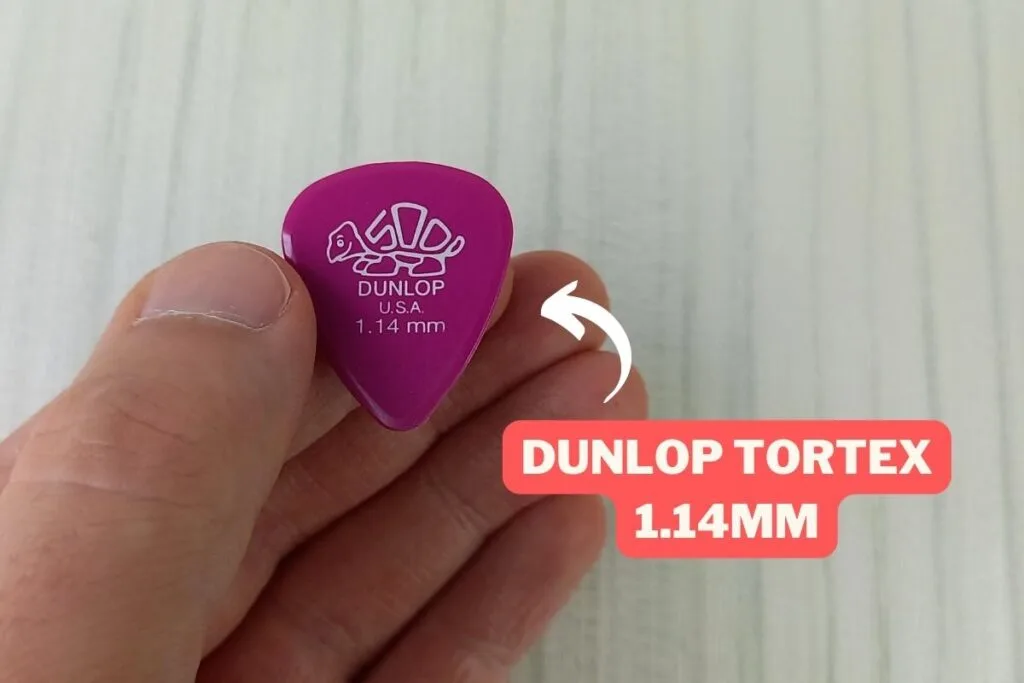
Positives
- Warmer tone compared to thinner picks
- Tough and durable material
Negatives
- It’s a bit thick, so might tire your hands easier
- Warmer sound isn’t for everyone
Why I recommend this pick for beginners:
This is my personal pick choice when I’m playing bass guitar. It’s on the thicker side (1.14mm), which gives a nice full tone to whatever I’m playing compared to thinner picks. This is because there’s more force behind the pick as it’s not bending around the string.
Not only this, but the Tortex picks are made from a tough material. This is especially important for bass, as they’re constantly working against the force of a very thick string. In fact, this was an old guitar pick of mine, and I’m yet to wear it out!
But, this pick might not be for everyone. With it being quite thick, it can tire your picking hand faster than a thinner pick. Again, you’re working against some very thick strings, so having a thicker pick means that you’ll be using more force to get the pick past the string. A thinner pick will simply flex around the string – saving your wrist some energy!
Likewise, I like this pick because it makes my bass stand out, but that might not be to everyone’s taste. If you’re looking for a pick that will give you a subtler sound, a thinner pick might be the way to go.
All that being said, I still think that this is a great pick for any beginner starting their bass guitar journey.
Conclusion
These have been my personal top choices for guitar picks for beginners. As with anything, every person will have their own preferences. That’s why the variety packs make so much sense to me, and have won every category in this article. Taking the time to find a pick that works for you can make such a difference to your playing style, sound, and comfort.
I still remember when I first discovered my favourite guitar pick (the Dunlop Jazz III) – playing became so much easier, and practising felt exciting again. At the end of the day, I hope that’s what you find from this article – a guitar pick that can become your guitar pick in your journey as a beginner, and beyond.


Conor is a music producer, multi-instrumentalist, and all-round enthusiast from the UK with over 15 years of experience. He’s the founder and sole-content creator for the roundtable audio blog and YouTube channel.
